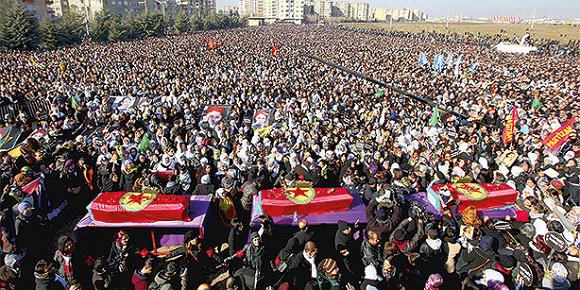“These efforts had created hope for a peaceful and just Turkey for all, including for the Kurdish minority. The gains of the peace-process are about to be lost if authorities fail to re-orient policies away from confrontation and military actions into negotiations and trust building.”
According to a 31 August report by the Turkish Human Rights Association, 47 civilians were killed as a result of conflict only between 21 July and 28 August; 2544 individuals were detained and security forces intervened to end 144 demonstrations. In addition, publication bans and prosecution of journalists and bloggers have unduly restricted the right to freedom of expression and the right to receive information. The toll of the conflict is quickly raising.
Conflict escalated quickly following the 21 July bombing in Suruç, a small town near the border with Syria, which left 32 young people dead and around 100 injured. The attack was attributed to the Islamic State (IS). The day after, on 22 July, the PKK killed two Turkish police officers as a retaliation of the Suruç bombing. It blamed the government for having tacitly supported the IS and failed to initiate efforts to protect Kurdish groups from its brutal attacks.
“The PKK should refrain from the use of violence,” said Ekelove-Slydal. “Violence will only harm the struggle to improve the situations of the Kurdish minority and risk targeting innocent people in violation of international law.”
Turkey shifted its policies in late July, allowing the US-led coalition against the IS to use its air base at Incirlik to attack IS positions in Iraq and Syria. In addition, Turkish fighter planes attacked IS in northern Syria for the first time. However, critics maintain that during the military operations most Turkish aircrafts attacked PKK positions in Northern Iraq rather than the IS. For a long time, foreign volunteers traveled to Syria through Turkey to fight on the side of the IS and weapons were transported from Turkey into Syria.
The Turkish government have rebutted charges that security forces had willingly been letting jihadists cross the border. In a visible support to the fight against the IS, Turkish security forces now detain hundreds of IS militants and sympathisers inside Turkey.
However, tensions remain high due to widespread attacks on Kurdish affiliated political and cultural organisations and individuals throughout the country. “The People’s Democratic Party’s (HDP) offices and representatives have become targets of mob attacks,” said Mine Yildirim, Head of Norwegian Helsinki Committee projects in Turkey. “The HDP gained 13.1 per cent of the votes and passed the 10 % threshold in the 7 June Parliamentary Elections. This gave rise to hopes that the Kurdish political movement would remain peaceful and become a part of mainstream politics. Now, allegations abound that police and security forces do not effectively protect Kurdish offices and individuals.”
In a further negative development, on 9 September prosecution started against the co-head of the HDP, Selahattin Demirtaş based on allegations that he has made propaganda for an illegal organization; the PKK.
The Norwegian Helsinki Committee is concerned that Turkey’s President Recep Tayyip Erdogan contributes to the polarization of society by his statements accusing the HDP of acting on behalf of the PKK. “Two days after Demirtas publicly asked for the PKK to disarm and cease armed conflict against Turkey (on 14 July), the President said that HDP acts as a parliamentary extension of the PKK”, said Yildirim, “Both the Government and the President repeatedly give messages of retaliation rather than of pursuing peace through negotiations.”
In a pattern of abuse and lack of protective measures by authorities, there is widespread harassment and intimidation of journalists, human rights defenders and activists.
“We continue to receive reports about ineffective protection of businesses and individuals who are perceived to be affiliated with the Kurdish cause against mob attacks and vandalism”, said Ekelove-Slydal. “The current atmosphere of insecurity raises concerns regarding the fairness of parliamentary elections, which are set to take place on 1 November. Free and fair elections can only take place in a safe environment where rule of law is effective.”
On this background, the Norwegian Helsinki Committee:
– Urges all parties to return to the peace process by ceasing military activities, re-engage in negotiations and adopt a language of peace;
– Calls on the Turkish Government to prevent mob attacks and harassment. It should protect all of its citizens;
– Calls on the Turkish authorities to investigate and prosecute human rights and humanitarian law violations in all areas of fighting, including in the over one hundred special security areas in the Eastern part of the country;
– Calls on the EU, Norway and other democratic Governments to contribute to restarting the peace process; placing pressure on Turkey’s authorities to refrain from actions and rhetoric that will further undermine peace efforts.
For more information and comments, contact Gunnar M. Ekelove-Slydal (+47 95210307 / [email protected]) or Mine Yildirim (+90 533 338 2961 / [email protected]).
